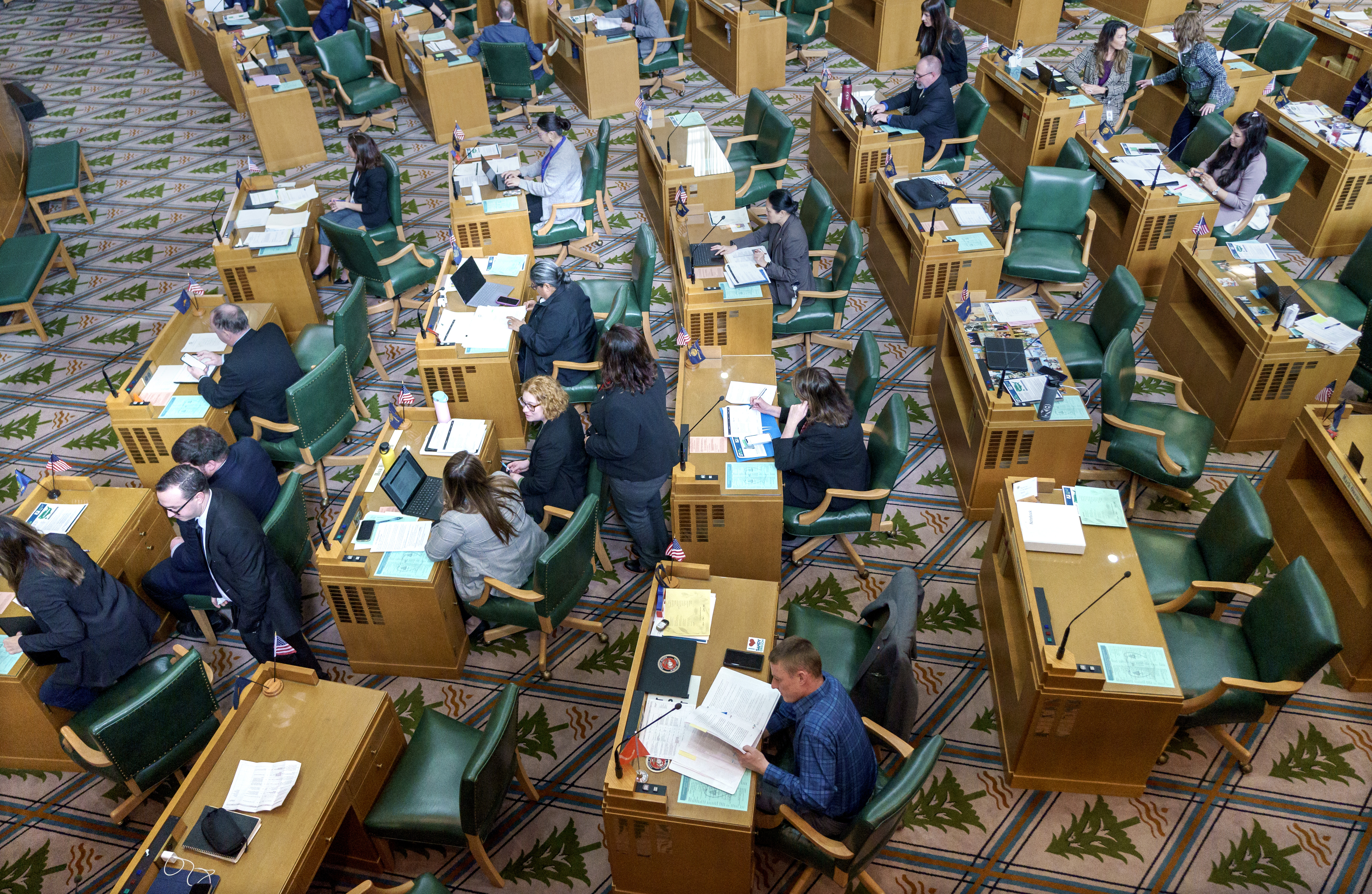
In this file photo, the Oregon House of Representatives convened at the Oregon State Capitol in Salem, March 20, 2023.
Kristyna Wentz-Graff / OPB
A conservative Oregon lawmaker suggested earlier this month that Muslims, atheists and other non-Christians are unfit to serve in elected office.
State Rep. E. Werner Reschke, R-Malin, made the remarks Jan. 17, in an appearance on “Save The Nation.” Streamed on Facebook, the daily talk show is affiliated with the National Association of Christian Lawmakers, of which Reschke is a member. It bills itself as taking on “major public policy issues facing the United States today from a Christian worldview.”
We are happy to announce Rep. E. Werner Reschke @EWReschke as our #Oregon NACL State Chair! This is NACL’s official 34th state chair. We appreciate Rep. Reschke’s leadership and ask everyone to pray for him and the state of Oregon! #NACL #SaveTheNation https://t.co/pQByvMT8n0 pic.twitter.com/qTbiqcQkCC
— National Association of Christian Lawmakers (@ChristLawmakers) November 24, 2023
The show’s host, former Arkansas lawmaker Jason Rapert, spent much of the 28-minute episode asking Reschke about what he called the “sad reality of the lax treatment of drugs” in Oregon. Reschke, who has repeatedly pressed for a repeal of 2020′s Ballot Measure 110, responded that drug decriminalization has driven homelessness and crime, and “makes our state unlivable.” The Klamath County legislator criticized Democrats for permissive policies, and argued that spirituality and church leaders are a necessary part of the solution.
Roughly 22 minutes into the episode, Rapert asked a broader question: Why Reschke feels it is important that Christians “be involved in government.” Reschke responded that he was inspired to run for office in 2016 by figures like George Washington, James Madison, Abraham Lincoln and Ronald Reagan.
“You go back in history, and you look at men and the struggles that they faced, and the faith that they had,” Reschke said. “Those are the types of people you want in government making tough decisions at tough times. You don’t want a materialist. You don’t want an atheist. You don’t want a Muslim… You want somebody who understands what truth is, and understands the nature of man, the nature of government and the nature of God.”
The remarks quickly drew fire from the Freedom From Religion Foundation, a Wisconsin nonprofit that advocates keeping religion out of governance. The group sent Reschke a letter last week that suggested Washington, Lincoln and Madison were not the devout Christians that he had portrayed, and chastised him for his comments.
“Your duty is to support the state and federal Constitutions and to protect the rights of conscience of your constituents, not to promote your personal religious views, much less a Christian theocracy,” read the letter, which called on Reschke to “apologize to all non-Christian and nonreligious” people in his legislative district, or to resign.
Reschke’s comment was also flagged by Right Wing Watch, an initiative of the progressive advocacy group People for the American Way.
Reschke told OPB in an email his comments have been “grossly taken out of context.” But when asked for more specifics about what he meant to say, if not that Muslims and other non-Christians are unfit to lead, Reschke did not respond.
Reaction has been muted in Oregon’s legislature. It’s not clear how many of the state’s 90 lawmakers identify as atheists, but the Legislature does include at least one Muslim member: state Sen. Kayse Jama, a Portland Democrat.
“I am disheartened to see one of my legislative colleagues express views contrary to American values, the U.S. Constitution, and our collective aspiration of building a more perfect union,” Jama said in a statement Monday after OPB asked about Reschke’s remarks. “Our ability to live and work with our fellow Oregonians who speak different languages, pray or vote different ways, celebrate different cultures is our strength.”
Born in Somalia to a nomadic family, Jama came to the U.S. as a refugee after civil war erupted in his home country. Before entering politics, Jama co-founded Unite Oregon, a group dedicated to improving racial and economic justice for people of color, immigrants, refugees and people from low-income backgrounds.
“Like so many, I came to this country because it offered the promise of opportunity and equality,” Jama said, adding: “My colleague’s rhetoric is too common today. The politics of division are dangerous, fueling increased hate crimes and violence against people who are Jewish, Muslim, Asian American, immigrants and refugees, and those who have been ‘othered.’”
Reschke told OPB he had not meant to suggest Jama or any other non-Christian lawmaker was unfit to serve.
“I believe Senator Jama is qualified to be a Senator, as well as any other currently serving legislator duly elected by the people or appointed by County Commissioners,” he said.
Reschke’s complete comments suggest otherwise. Just after making his remark about Muslims and atheists, Reschke told his interviewer that in Oregon “we have a lot of people who are godless, unfortunately, leading the way, and it’s the blind leading the blind.”
House Republican Leader Jeff Helfrich, R-Hood River, distanced himself from Reschke’s remarks when asked about the matter by OPB. But he did not reference the lawmaker directly and instead took the opportunity to knock Democrats.
“House Republicans, like all elected members, swear an oath to the Constitution of the United States and the Constitution of Oregon,” Helfrich said in a statement. “Neither document contains a religious test for elected office. We welcome all people, regardless of religion, who share our values and wish to see Oregon set a new course away from the radical and destructive policies of the majority party.”
Polling has suggested that the West Coast, and Oregon in particular, is among the least religious regions of the U.S. Even so, a study by the Pew Research Center in 2014 found that 61% of adults in the state identify as Christian, while 31% are not affiliated with a religion and 1% identify as Muslim.


